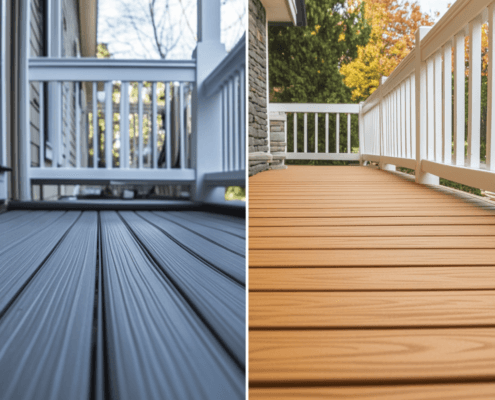Transform Your Outdoor Space with Durable and Low-Maintenance Vinyl Decking
As outdoor living spaces become an essential part of modern homes, vinyl decking has emerged as one of the most popular choices for homeowners. From its long-lasting durability to its low-maintenance appeal, this material is quickly becoming the go-to solution for creating a beautiful, functional outdoor space. But what makes it stand out from other materials? Let’s explore why it’s considered the future of outdoor spaces.
The Cost of Vinyl Decking: An Investment in the Future
One of the first things homeowners consider when installing a new deck is the cost. While this type of decking may have a higher upfront cost compared to other materials like wood or composite, it often saves you money over the long term. Unlike wood decks, which require regular staining, sealing, and repairs, it needs minimal upkeep. This means fewer maintenance costs and more time enjoying your outdoor space.
If you’re considering a vinyl deck for your outdoor patio, you might find that the cost can vary depending on the type of vinyl and the deck’s size. However, once installed, you’ll appreciate the reduced maintenance costs, which often make it a more cost-effective option in the long run.
Vinyl Decking vs Composite Decking: Pros and Cons
A common question homeowners ask is how vinyl compares to composite materials. So, how does it stack up against composite decking? Both materials are durable and low-maintenance, but there are key differences.
- Durability: Vinyl is highly resistant to water, fading, and scratching, making it a long-lasting option. Composite decking, on the other hand, is often made from a blend of wood and plastic, which can deteriorate over time when exposed to moisture.
- Maintenance: Vinyl requires little maintenance. All it needs is a good cleaning once or twice a year. Composite decking, although low-maintenance, may require periodic sealing or staining to maintain its appearance.
- Appearance: Vinyl offers a sleek, modern look with a wide range of color options. Composite decking tends to have a more natural look but may fade over time. Vinyl, however, keeps its color and appearance for much longer.
Is Vinyl Decking Worth the Investment?
If you’re wondering whether this type of decking is worth the investment, it’s important to consider both the upfront cost and the long-term benefits. While the initial price might be higher than wood or composite options, its durability and low maintenance requirements make it a wise choice for homeowners who want to invest in their outdoor spaces.
Long-Lasting Material Options
When it comes to long-lasting material options, there are several choices available. The most popular is rigid PVC, which offers excellent flexibility and durability. Unlike wood, it won’t warp, rot, or require frequent treatments. In addition, rigid PVC is resistant to moisture and UV damage, ensuring that your deck remains looking great year after year.
Another benefit of vinyl decking is its resistance to mold and mildew. This makes it an ideal choice for areas with high humidity or where rain is frequent. If you’re looking for a deck that won’t deteriorate with time, vinyl is your best bet.

Compare vinyl decking with composite decking to see which material works best for your outdoor space.
Vinyl Decking vs Composite: Which is Right for You?
When deciding between vinyl and composite decking, it’s essential to think about your lifestyle, climate, and budget. Here’s a quick breakdown of the pros and cons of each material:
Vinyl Decking:
- Pros: Superior water resistance, low maintenance, fade-resistant, wide range of colors.
- Cons: Higher upfront cost, may not offer the same natural wood appearance as composite.
Composite Decking:
- Pros: More natural look, available in a variety of textures, low maintenance.
- Cons: Can fade over time, more expensive than wood, requires sealing.
How to Choose the Right Vinyl Decking for Your Home
Choosing the right decking involves considering factors like cost, climate, and the level of maintenance you’re willing to invest in. For many homeowners, vinyl offers the best combination of durability and ease of care, especially for outdoor patios and flat roof decks that require waterproofing.
If you’re looking for a material that’s both practical and stylish, vinyl could be the ideal solution. When choosing the best option, look for products that offer a long-lasting material that fits your budget and aesthetic preferences.
Frequently Asked Questions (FAQs)
Q: How does vinyl decking compare to wood decking? A: Vinyl requires much less maintenance than wood. It’s water-resistant, durable, and won’t rot or warp like wood. While the cost may be higher initially, it can save you money in the long run due to lower maintenance needs.
Q: Is composite decking more durable than vinyl? A: While composite decking is durable, vinyl is generally more resistant to water and weathering. It requires less maintenance and lasts longer than composite in most climates.
Q: What is the best type of vinyl decking? A: Rigid PVC is often considered the best type because it offers superior durability, flexibility, and moisture resistance. It’s also resistant to UV damage, keeping your deck looking great for years.
Q: How much does vinyl decking cost? A: The cost can vary depending on the quality and size of the deck. While it’s typically more expensive than wood, the low maintenance required can make it a more cost-effective option over time.
Additional FAQs
Q: What are the different types of decking options available? A: There are several options, such as vinyl, composite, wood, and aluminum. Among these, vinyl stands out due to its water resistance, low maintenance, and variety of color choices. If you want something long-lasting with minimal upkeep, vinyl is the ideal choice.
Q: How can I design and decorate my vinyl deck to suit my home? A: Vinyl decking is a great choice for deck design because it offers a wide range of colors and textures. You can complement your deck with outdoor furniture, planters, and decorative lighting to create a welcoming and stylish space. Since vinyl is durable and resistant to fading, your design will look fresh year after year.
Q: How does the durability and features of vinyl compare to other decking materials? A: Vinyl is incredibly durable. Unlike wood, it won’t warp, rot, or require constant sealing. It’s resistant to UV rays, moisture, and mold, which makes it ideal for harsh weather conditions. In comparison, wood can fade, splinter, or even grow mold, and composite decking, though strong, requires occasional maintenance to prevent wear. Vinyl keeps its appearance and functionality longer.
Are you ready to upgrade your outdoor space with vinyl decking? Contact us today at Commercial Flat Roofs to learn more about vinyl decking installation and how it can improve your home’s exterior.







